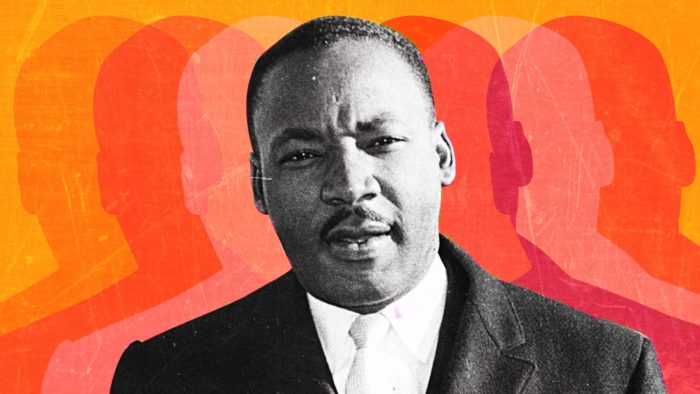
With the passing of each holiday in his remembrance, the legacy of Martin Luther King Jr. becomes further absorbed into a liberal narrative of American progress but King’s actual politics and organizing speak to a far more radical legacy.
By Frank Ascaso
A year before his assassination, Martin Luther King was talking revolution. “I am convinced that if we are to get on to the right side of the world revolution,” he said, “we as a nation must undergo a radical revolution of values.” Speaking before a venue of religious figures at New York’s Riverside Church in April of 1967, King began to link the struggles for liberation then erupting all over the globe to a collective revolution of values. Importantly for King, a reverend and theologian, this was to be a spiritual revolution, one in which the priorities and privileges of our culture, our worldviews, and understanding of our role in the world must be transformed into a better version of ourselves, toward “a beautiful symphony of brotherhood [sic],” he said.
King’s revolutionary status comes from his practice of social movement organizing and faith in the causes and self-activity of the people; from his intersectional analysis of the root causes of social injustice in structural elements of “racism, materialism, and militarism.”
The Three Evils
King’s revolution of values was not just idealism, for in that same speech King linked the spiritual revolution he called for to an analysis of the three evils afflicting American society: “the giant triplets of racism, extreme materialism, and militarism.” By this time in 1967, after the legislative victories in the 1964 Civil Rights Act and the 1965 Voting Rights Act, King saw that the struggle for black liberation in the U.S. could not be confined to political struggle and divorced from other structural oppressions. Racism and white supremacy were indelibly tied to “materialism,” and “militarism,” the forces of inequality and violence that lay at the root of American society.
Indeed, against inequality King was about to launch the “Poor People’s Campaign,” a national organizing effort to address the poverty and inequality that still kept African Americans as second class citizens, even with new political rights. In the wake of legislative victories, King argued that “now we are dealing with issues that cannot be solved without the nation spending billions of dollars and undergoing a radical redistribution of economic power.” There was still an economic revolution to be won, without which the struggle for black freedom would be forever incomplete.
Unfinished Revolution
And King saw the militarism and violence at the heart of the American state as part of the problem. The same violence that murdered black people at home was marshalled to invade, bomb and destroy the people of Vietnam. “The bombs of Vietnam,” he once said, “explode at home” because they “destroy the dream and possibility for a decent America.” This again was a structural, economic question for King, as the spending on the Vietnam War took money away from the War on Poverty domestic programs. But it also reflected his vision of spiritual transformation. Government actions in Vietnam spoke to a spiritual bankruptcy of a people so invested in the “giant triplets” he identified as to not be concerned with the fate and wellbeing of the Vietnamese people.
King’s unfinished revolution is our revolution; let’s get working.
Finally, King’s revolutionary politics were not limited to his intersectional analysis, but embedded in his revolutionary practice. King devoted his life to building mass movements that could empower and transform. His faith and solidarity in the self-activity of people engaged in social struggle transcended his own political positions. When in 1966 and 1967 American cities exploded in riots and violence King defended the rioters despite his own personal commitment to non-violence. Seeking to explain to a hostile media, King said that “the riot is the language of the unheard.” He continued that the country had “failed to hear that the promises of freedom and justice have not been met, and it has failed to hear that large segments of white society are more concerned about tranquility and the status quo than about justice, equality and humanity.”
This is the King we honor and celebrate today, and one that contemporary revolutionaries should learn from. Although he missed major aspects of oppression – patriarchy, for example, or the ecological crisis we are facing – his commitment to revolutionary values is unparalleled. King’s revolutionary status comes from his practice of social movement organizing and faith in the causes and self-activity of the people; from his intersectional analysis of the root causes of social injustice in structural elements of “racism, materialism, and militarism;” and in his spiritual commitment to the revolutionary values of “justice, equality and humanity.” We would do well to heed his message now, as potent today as it was 50 years ago before his life was cut short. King’s unfinished revolution is our revolution; let’s get working.
Frank Ascaso is a historian, educator and member of Black Rose Anarchist Federation based in Seattle, Washington.
If you enjoyed this piece consider you may also enjoy “No Time for Patience: Fascism, Climate, and Capitalism” by Mark Bray or “In November We Remember Those Who Gave Everything” by Tariq Khan.
